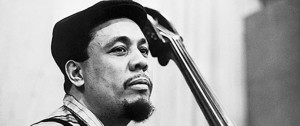 Charles Mingus was recognized in his lifetime as a virtuoso bassist, accomplished pianist and bandleader. Today his enduring legacy may be as a major 20th-century composer. To grasp some sense of his growing importance, consider the fact that his entire body of work has been acquired by the Library of Congress. This is not only a first for jazz, but also for an African-American composer. At this death he left behind more than 100 albums and over 300 compositions – music that is still considered far ahead of its time. In the field of jazz, his is the largest legacy of composition in American music after Duke Ellington.
Charles Mingus was recognized in his lifetime as a virtuoso bassist, accomplished pianist and bandleader. Today his enduring legacy may be as a major 20th-century composer. To grasp some sense of his growing importance, consider the fact that his entire body of work has been acquired by the Library of Congress. This is not only a first for jazz, but also for an African-American composer. At this death he left behind more than 100 albums and over 300 compositions – music that is still considered far ahead of its time. In the field of jazz, his is the largest legacy of composition in American music after Duke Ellington.
To think of Mingus as a jazz musician is correct – at least to a certain degree, but the term should be understood in its broadest sense. He was influenced by composers of many different stripes, and it wouldn’t be hard to find passages with as much kinship to Debussy as to gospel and blues. Imagine hearing jazz performed by bassoon, flute, bass clarinet and horn, and you begin to get the subtlety of this composer. Yes, of course, the saxophones, brass and rhythm sections are there too, but this is music that surprises at every turn. Listening beyond the instrumental colors takes us into a world whose treatment of harmony and time is truly unique. Mingus can easily shift between an almost stately blues pace to a double time passage that could have belonged to bebop, and just as fluently, he can take us back out of that hectic rate to his original pace without the least amount of discomfort to the listener. His chord changes are advanced, unpredictable and yet entirely “right” to the ear. To improvise in Mingus is to reach well beyond the tonal palette of traditional “changes”. His is a truly original voice.
Last night, Manhattan’s St. Bartholomew’s Church served as the location for a concert devoted to the music of Charles Mingus, performed by the Mingus Orchestra. The event included three of the composer’s works conducted by Gunther Schuller on a nicely varied program. We were treated to everything from a wind trio to a closing number that featured the full ensemble playing as they walked among the audience members, a throwback to the traditions of New Orleans.
What struck me most about the program, though, was that many in the audience were young musicians. They were participants from the Charles Mingus High School Competition and Festival, held in New York City this weekend. Imagine bringing young musicians from as far away as California and as near as LaGuardia High School. Each ensemble had prepared music by Mingus, performed it, participated in clinics and were adjudicated by a panel that included Mr. Schuller himself.
Building an awareness of the this uniquely gifted composer and supporting a new generation of jazz musicians with an appreciation for his work has been the driving purpose of the composer’s widow, Sue Mingus. In addition to the Mingus Orchestra, she has helped spearhead the Mingus Dynasty and the Mingus Dynasty Big Band, all fixtures at the Jazz Standard. She co-produced this festival with Justin DiCioccio.
I often return to the idea of how we build arts communities. It seems like the answers are as varied as there are people and causes, but surely one of the ways to create a community around a particular composer is to experience it from the inside: to actually play the music. Earlier this week I wrote an entry on seeing young conductors learning the traditions of Beethoven from a master, it is inspiring to know that in the same city there was another event focusing on an American master of jazz.
I’m guessing that many of the high school students had never even heard of Charles Mingus before they began to work their minds, ears and instruments around his music. By now, his work has become a part of them, just as ingrained as a scale or arpeggio. Kudos to the schools from California, Connecticut, Massachusetts, New Jersey, New York and Wisconsin who participated and to all who worked so hard to make this weekend a success.
I’ll close this post with words from Gunther Schuller: “You are guaranteed a great and profound experience when you perform music by this giant of jazz “composer.” As I left the church last night, there were some very excited students getting back on their buses. At least in my own mind, as I looked at them, I thought they would agree.

[…] A post from a few weeks back, but still relevant: […]